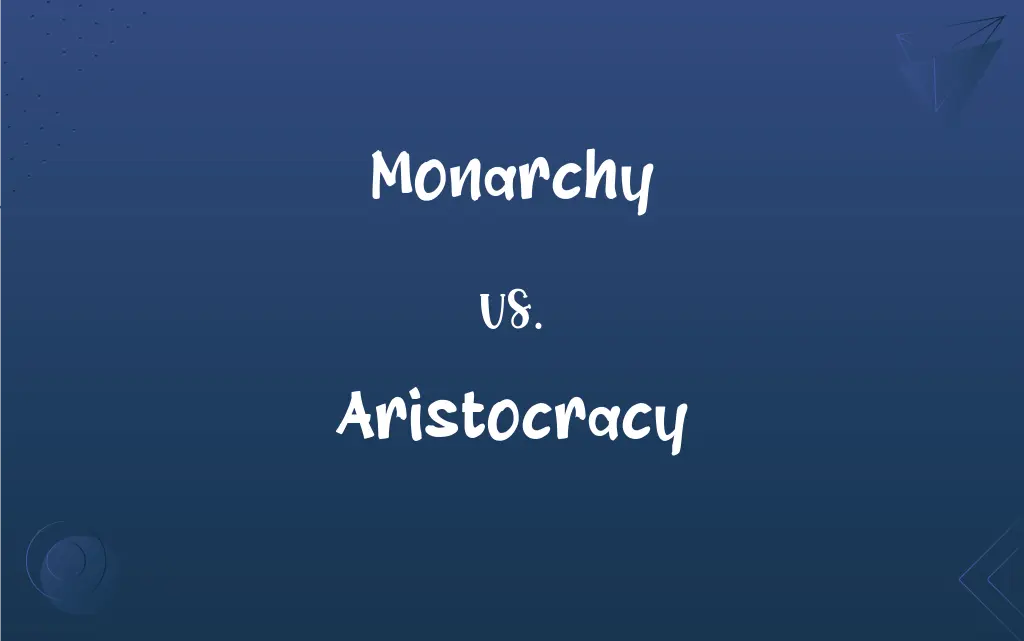Monarchy vs. Aristocracy: What's the Difference?
Edited by Aimie Carlson || By Janet White || Published on December 31, 2023
Monarchy refers to government ruled by a single person (king or queen) as head of state; Aristocracy refers to government run by a privileged class based on birth, wealth, or title.

Key Differences
A monarchy is a form of government where a single individual, typically a king or queen, serves as the head of state, often in a hereditary capacity. An aristocracy, on the other hand, involves a group of privileged individuals, often defined by birth, wealth, or title, holding significant power or influence.
In a monarchy, the monarch's role can range from ceremonial to possessing significant executive powers, depending on the constitution. Aristocracy refers to the upper class in society, often holding land, titles, and social privileges.
Monarchies often symbolize the historical and cultural heritage of a nation, with the monarch being a unifying figure. Aristocracies, while also influential in culture and heritage, represent a broader elite class with varying degrees of political influence.
Constitutional monarchies limit the monarch's powers, making them mostly symbolic leaders, while the government is run democratically. In contrast, aristocracies can exist within various forms of government, influencing policies through wealth and social standing.
Hereditary succession is a key feature in most monarchies, whereas aristocracy is characterized by a broader elite class, not limited to a single family lineage.
ADVERTISEMENT
Comparison Chart
Definition
Rule by a single person, often hereditary
Rule by a privileged class based on birth or wealth
Power Structure
Centralized in one individual (king or queen)
Distributed among a group of elite individuals
Succession
Typically hereditary, passing within a family
Based on class or social status, not just family
Symbolism
Represents national heritage and unity
Represents upper class, privilege, and influence
Government Interaction
Can be purely ceremonial or have governing power
Usually does not directly govern, but influences
ADVERTISEMENT
Monarchy and Aristocracy Definitions
Monarchy
A system where a monarch holds supreme or significant power.
The monarchy had absolute power in medieval Europe.
Aristocracy
A class of people holding exceptional rank and privileges.
The aristocracy in medieval Europe owned most of the land.
Monarchy
A government where the monarch's powers are ceremonial.
In modern times, many monarchies are largely symbolic.
Aristocracy
Government by the nobility.
The aristocracy wielded significant influence in the government.
Monarchy
Government ruled by a king or queen.
The United Kingdom is a constitutional monarchy.
Aristocracy
The highest social class in certain societies.
The aristocracy often had exclusive rights and privileges.
Monarchy
A state headed by a single hereditary ruler.
In a monarchy, the crown is passed down through the royal family.
Aristocracy
Elite or privileged upper class.
The aristocracy was known for its lavish lifestyle.
Monarchy
Rule by a sovereign, often within a constitutional framework.
The monarchy coexists with democratic institutions in several countries.
Aristocracy
Persons of high social standing, usually by birth.
Members of the aristocracy often attended exclusive schools.
Monarchy
Government by a monarch.
Aristocracy
A hereditary ruling class; nobility.
Monarchy
A state ruled or headed by a monarch.
Aristocracy
Government by a ruling class.
FAQs
What is a monarchy?
A monarchy is a form of government with a monarch (king or queen) at the head.
How does succession work in a monarchy?
Succession in a monarchy typically follows a hereditary line within the royal family.
What defines an aristocracy?
Aristocracy is a class of people with high social status, often hereditary, holding privileges and influence.
Can a monarchy and aristocracy coexist?
Yes, historically, monarchies often had an aristocratic class with considerable influence.
How do people become part of the aristocracy?
People are usually born into the aristocracy, though it can sometimes be achieved through wealth or royal favor.
How do monarchies impact culture?
Monarchies often shape national identity and cultural heritage.
Are there still absolute monarchies?
Yes, but they are rare, with most monarchies being constitutional.
Is aristocracy a form of government?
Aristocracy isn't a government form but refers to a privileged social class influencing governance.
Do all monarchies have absolute power?
No, many modern monarchies are constitutional with limited or ceremonial powers.
What privileges do aristocrats have?
Historically, aristocrats had privileges like land ownership, exclusive rights, and social status.
Can someone join the aristocracy by marriage?
Yes, marrying into an aristocratic family can confer aristocratic status.
Do aristocrats still have power today?
The power of aristocrats varies, but it's generally more social and economic than political.
What is the role of aristocracy in democracy?
In democracies, aristocracy's role is primarily social and economic, with less direct political power.
Can monarchies be abolished?
Yes, several countries have transitioned from monarchies to republics.
What roles do aristocrats play in government?
Aristocrats historically held various government roles, though their influence varies in modern times.
What is a constitutional monarchy?
A constitutional monarchy is a system where the monarch's powers are limited by a constitution.
Is monarchy elected?
No, monarchy is usually hereditary and not an elected position.
How does aristocracy differ from oligarchy?
Aristocracy is rule by the elite based on birth or status, while oligarchy is rule by a few powerful individuals, regardless of birth.
How does aristocracy influence society?
Aristocracies can influence cultural, social, and sometimes political aspects of society.
Do monarchies contribute to stability?
Monarchies can contribute to stability through continuity and tradition, though this varies.
About Author
Written by
Janet WhiteJanet White has been an esteemed writer and blogger for Difference Wiki. Holding a Master's degree in Science and Medical Journalism from the prestigious Boston University, she has consistently demonstrated her expertise and passion for her field. When she's not immersed in her work, Janet relishes her time exercising, delving into a good book, and cherishing moments with friends and family.
Edited by
Aimie CarlsonAimie Carlson, holding a master's degree in English literature, is a fervent English language enthusiast. She lends her writing talents to Difference Wiki, a prominent website that specializes in comparisons, offering readers insightful analyses that both captivate and inform.






































































